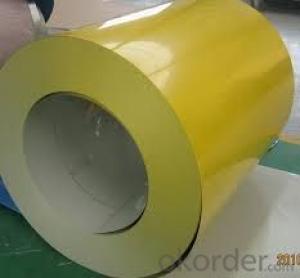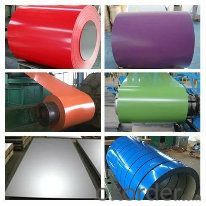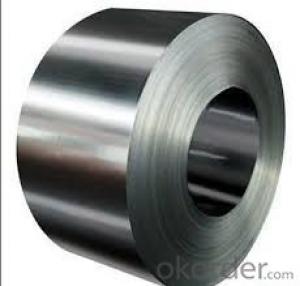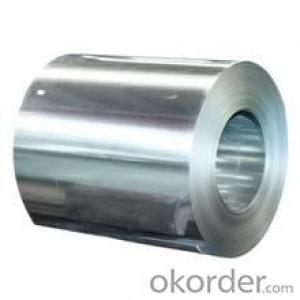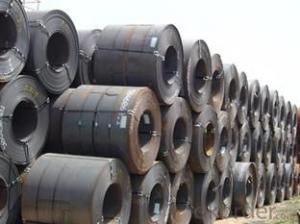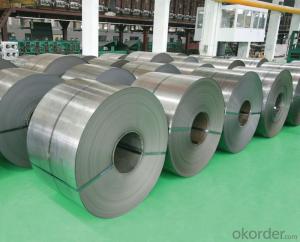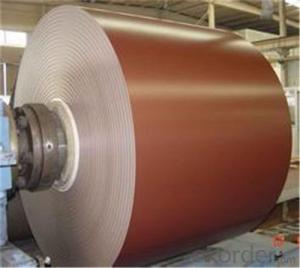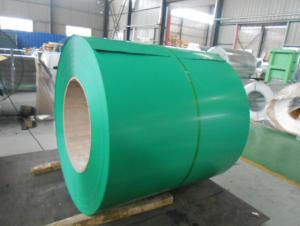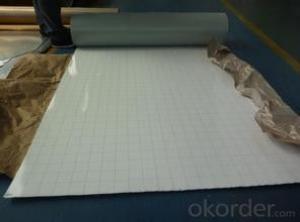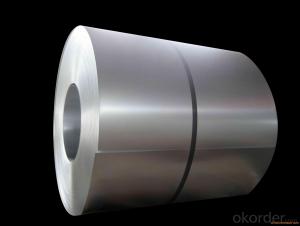Galvalume Steel Coil/Gl/Zinc Aluminized Steel
- Loading Port:
- Shanghai
- Payment Terms:
- TT OR LC
- Min Order Qty:
- 50 m.t.
- Supply Capability:
- 20000 m.t./month
OKorder Service Pledge
OKorder Financial Service
You Might Also Like
Product Description
Specification:
| Product Name: | Galvalume steel coil/GL/Zinc Aluminized steel |
Standard: | JIS G3302-1998/EN10142/ASTM A653/ASTM A792/ AISI/BS/ DIN/GB |
| Price: | US $600-800 / Metric Ton |
| Trade Terms: | FOB/CNF/CIF |
| Supply Ability: | 30000 Metric Ton monthly |
| Packing: | standard exporting packing or at buyer's requirement |
| Payment Terms: | L/C,T/T |
| Delivery time: | Within 15-30days after we receive deposit or L/C at sight |
| Specifications: | Brand Name :CNBM Thickness:0.14-0.6mm Type:coil/sheet/strips Width:600- 1250mm Length: Zinc Coating:40g-150g/ Coil ID :508mm or 601mm Coil Weight :3-8MT Place of Origin:China Tianjing,shanghai Standard: AISI, ASTM, BS, DIN, GB, JIS Technique:Cold Rolled Surface Treatment:Anti-finger |
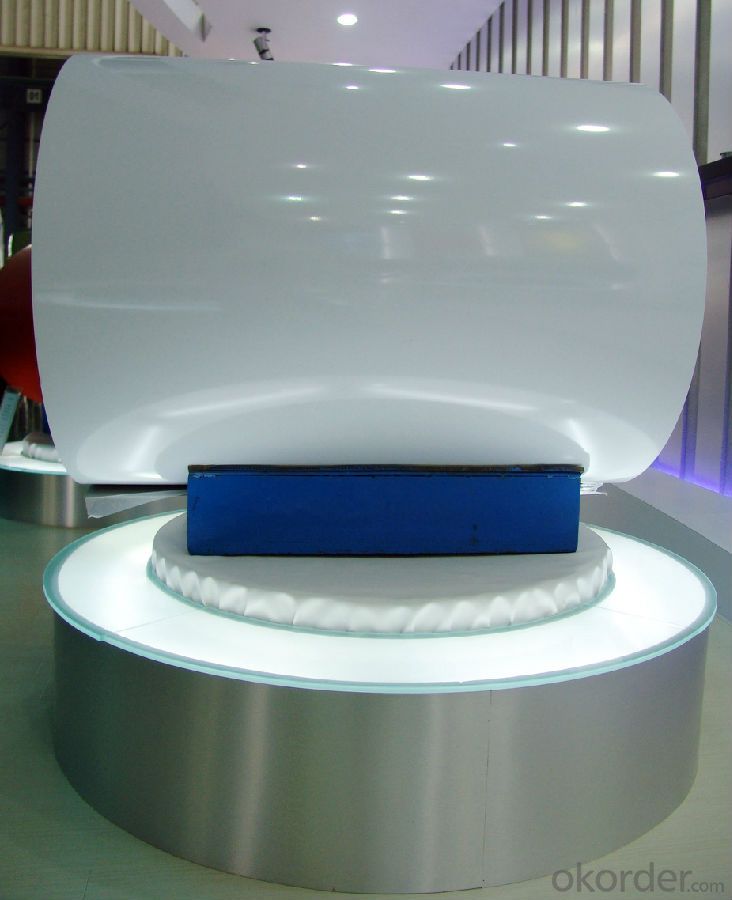
Application
1. Architecture Roofs and outside walls of civilian and industrial buildings, garage doors, fencings and window blinds
2. Appliances Industry Outer clad sheets for washing machine, refrigerator, television, air conditioner and ventilation system, explosion-proof strip, solar water heater and appliance parts
3. Auto Industry Muffler, heat shields of exhaust pipe and catalytic converter, auto parts & accessories under the frame, signboard in highway
4. Industrial Instruments Electric control cabinet, industrial refrigeration equipment, automatic vending machine
Service
1.MOQ:25 ton.
2.Delivery time;15-30days
3.Payment:30% deposite, 70% in L/C before delivery or T/T
4.We can guarantee 100% inspeciton before the shipment
5.We can 100% supply MTC.
Q&A What is your acceptable payment term?
ANSWER: TT,LC,OA etc
- Q: Is it possible to have a 25 room Hotel building with Steel structure. Thay is instead of traditional RCC can we have a 25 room hotel constructed using steel construction? Is it economic and how much time will it take to construct the same? Appraximate area would be 5000sq.ft to 10000sqft.
- it is possible...but with the current ever rising cost of steel...it is more expensive than reinforced concrete..... ...one more disadvantage is tat u have to use large I sections for the columns as steel do not take compression as good as concrete... ..tat is why u see..almost all totally steel structures are bridges where tensile strength rules more than compression.
- Q: so I am trying to drill holes in stainless steel shelving to hang something but my drill wont make any more than a small dent in the steel. I bought a bit for hard metals but it didn't do any better. I have an admittedly small drill (9.6v). is that the problem? do I just need a more powerful drill? any serious advice is appreciated. thanks
- When machining stainless you need a sharp tool and an abrasive cutting compound for the best results.Most tools will slide on the stainless rather than cut into it. Stainless is very soft and it stretches rather than cuts. Try to keep the bit cool, but a special cutting compound is advised.
- Q: When i was 15 i got caught steeling at Super A yes i know i cant believe it. They didnt call the cops or anything they released me to my aunt they took my name and adress and everythimg they said it wouldnt be on my record. But I'm not so sure. Will it be on my record if they didn't call the cops?i live in california. Is there any way i can check my record?
- Steeling? What's that? Did you take a piece of steel and weld it? I am confused?
- Q: I'm a Hobbyist and want to Build my own axial-flow jet engine,can I use steel as the Turbine blades instead of Titanium which I can't get easily?? What about the other parts I can use for...?!
- Yes you can use steel but you will want to use super alloys like hastaloy and inconel. These withstand the heat in the combustion areas. These are the actual materials used in these stages. If you only want your engine to have a service life of a few hours a conventional hot work steel like H-13 will probably be OK Blades are investment cast in foundries that carefully control the rate of cooling to create a very uniform grain structure
- Q: How are steel coils used in the production of metal fencing?
- Steel coils are used in the production of metal fencing by being unrolled, cut, and shaped into various fencing components such as posts, rails, and pickets. These coils provide a consistent and high-quality source of steel, ensuring durability and strength in the final fencing product.
- Q: What are the dimensions of steel coils used in the railway equipment industry?
- The railway equipment industry utilizes steel coils with dimensions that can vary according to the specific application and requirements. However, there are commonly observed dimensions for these steel coils, typically ranging from 3 to 5 feet in width and 10 to 15 feet in length. Likewise, the thickness of the steel coils exhibits variation, spanning from 0.01 to 0.5 inches. It should be noted that these dimensions are not set in stone and may fluctuate based on the specific demands of the railway equipment industry, such as the type of equipment being produced or the distinct purpose of the steel coils.
- Q: Can i use steel shot in a remington 870 wingmaster full choke 30 inch barrel. the shotgun is in great shape and about 20 or 25 years old probably. thank you. the steel shot i have got is 12 gauge 2 3/4 in 1550 velocity 1 1/16 oz 2 shot winchester xpert high velocity steel shot
- A full choke is not recommended for most steel shot. That gun was made before steel shot was popular and the barrel probably will not hold up to the hard steel shot. You have two options. Both will cost money. You can get the soft heavy shot and use that. Or you can buy a newer shotgun and use steel in it.
- Q: What exactly is surgical stainless steel made of (metals)? Does it contain nickel? If so, what % does it usually contain? I am deciding between surgical stainless steel piercings or titanium. Both same price and looks. I want to know which one is more hypo-allergenic and generally nickel free.
- um surgical stainless steel? lets try ... stainless steel... herp derp
- Q: What are the different types of steel coil surface finishes?
- There are several different types of steel coil surface finishes available, each with its own unique characteristics and applications. Some of the most common types include: 1. Hot rolled: This finish is achieved by rolling the steel at a high temperature, which results in a rough and textured surface. Hot rolled steel coils are commonly used in applications where aesthetics are not a priority, such as structural or industrial projects. 2. Cold rolled: In contrast to hot rolled steel, cold rolled steel coils are processed at lower temperatures, resulting in a smoother and more refined surface. This finish is ideal for applications where a clean and polished appearance is desired, such as automotive parts, appliances, and furniture. 3. Galvanized: Galvanized steel coils are coated with a layer of zinc to protect them from corrosion. This finish provides excellent resistance to rust and can be used in a variety of outdoor applications, including roofing, fencing, and signage. 4. Stainless steel: Stainless steel coils have a unique finish that is resistant to corrosion, staining, and rust. This makes them highly versatile and suitable for a wide range of applications, including kitchen appliances, medical equipment, and architectural projects. 5. Coated: Coated steel coils are treated with a protective layer of paint or other coatings to enhance their durability and aesthetic appeal. This finish is commonly used in the construction industry for applications such as roofing, siding, and garage doors. 6. Pre-painted: Pre-painted steel coils are coated with a layer of paint or resin before they are formed into the final product. This finish offers a wide range of colors and finishes, making it popular for applications such as building cladding, appliances, and automotive parts. Overall, the choice of steel coil surface finish depends on the specific requirements of the project, including aesthetics, corrosion resistance, and durability. Each finish has its own advantages and disadvantages, and it is important to consider these factors when selecting the appropriate type of steel coil surface finish for a particular application.
- Q: How are steel coils used in the manufacturing of electrical enclosures?
- Steel coils are used in the manufacturing of electrical enclosures as they provide the raw material for forming the enclosures' outer shells and structural components. The steel coils are processed and shaped through various techniques such as cutting, bending, and welding, to create the desired size and shape of the enclosure. The steel's strength and durability make it an ideal material choice for ensuring the enclosures can protect electrical equipment from environmental factors and provide safety for users.
Send your message to us
Galvalume Steel Coil/Gl/Zinc Aluminized Steel
- Loading Port:
- Shanghai
- Payment Terms:
- TT OR LC
- Min Order Qty:
- 50 m.t.
- Supply Capability:
- 20000 m.t./month
OKorder Service Pledge
OKorder Financial Service
Similar products
Hot products
Hot Searches
Related keywords
